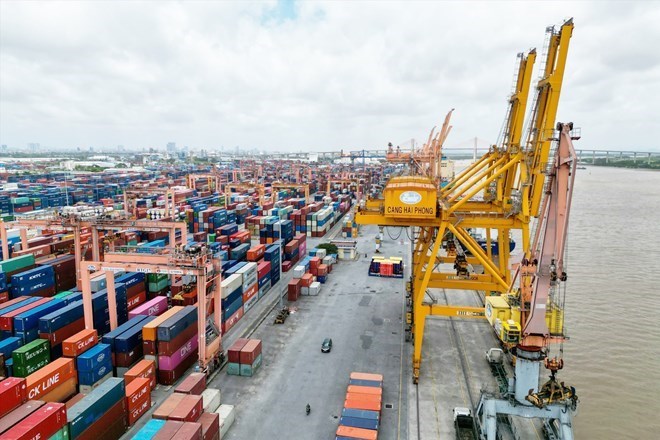
On August 26, the World Bank (WB) released a Review Report - an update on the Vietnamese economy. According to a senior economist at the WB, in the first half of the year, Vietnam's GDP grew by 6.4%, higher than the 5% growth rate in the first half of 2023, thanks to the recovery of manufactured exports, as well as higher investment and consumption levels.
Accordingly, goods imports and exports increased faster than forecast for the first half of 2024, thanks to stronger external demand, with exports and imports increasing by 16.9% and 17% respectively over the same period last year.
On the production side, manufacturing output grew by 7% from a low starting point, driving growth for the entire year, contributing to a quarter of GDP growth.
In addition, services contributed more than half of GDP growth, rising to 7.4%. In addition, export-related services such as transportation and warehousing benefited from the recovery in goods exports. At the same time, the hotel and restaurant sector also rebounded, with the number of international visitors reaching 8.8 million in June, higher than the number of visitors recorded before the COVID pandemic.
Assessing Vietnam's economic situation in the coming time, Ms. Dorstai Madani, Senior Economist of the World Bank in Vietnam, said that Vietnam has positive economic growth prospects with opportunities and risks generally balanced.
The World Bank forecasts that Vietnam's economy will grow by 6.1% in 2024, then up to 6.5% in 2025-2026. Previously, in the forecast released in April 2024, the World Bank predicted that Vietnam's economic growth would only reach 5.5% in 2024 and gradually increase to 6.0% in 2025.
The report also shows the resilience of the Vietnamese economy amid growing global challenges. Titled “Reaching new heights in capital markets”, the report notes that the economy has yet to return to its pre-pandemic growth path.
The World Bank recommends that Vietnam needs to boost public investment to both stimulate short-term demand and contribute to solving the infrastructure shortage, especially in the fields of energy, transport and logistics (which are bottlenecks hindering growth).
At the same time, the WB said that Vietnam needs to closely monitor the asset quality of banks due to increasing bad debts. Banks need to improve capital adequacy ratios and improve infrastructure construction to attract private investment.
Diversifying trade to further enhance integration will also be a factor in improving the resilience of Vietnam's economy.
Source: https://laodong.vn/kinh-doanh/world-bank-nang-du-bao-tang-truong-kinh-te-viet-nam-len-61-1385148.ldo



![[Photo] Panorama of the Opening Ceremony of the 43rd Nhan Dan Newspaper National Table Tennis Championship](https://vphoto.vietnam.vn/thumb/1200x675/vietnam/resource/IMAGE/2025/5/19/5e22950340b941309280448198bcf1d9)
![[Photo] Close-up of Tang Long Bridge, Thu Duc City after repairing rutting](https://vphoto.vietnam.vn/thumb/1200x675/vietnam/resource/IMAGE/2025/5/19/086736d9d11f43198f5bd8d78df9bd41)

![[Photo] President Luong Cuong presents the 40-year Party membership badge to Chief of the Office of the President Le Khanh Hai](https://vphoto.vietnam.vn/thumb/1200x675/vietnam/resource/IMAGE/2025/5/19/a22bc55dd7bf4a2ab7e3958d32282c15)
![[Photo] General Secretary To Lam attends the conference to review 10 years of implementing Directive No. 05 of the Politburo and evaluate the results of implementing Regulation No. 09 of the Central Public Security Party Committee.](https://vphoto.vietnam.vn/thumb/1200x675/vietnam/resource/IMAGE/2025/5/19/2f44458c655a4403acd7929dbbfa5039)


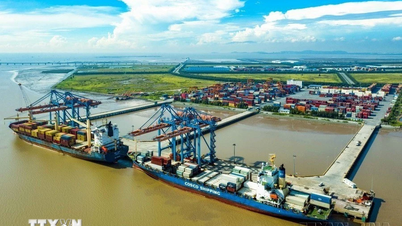



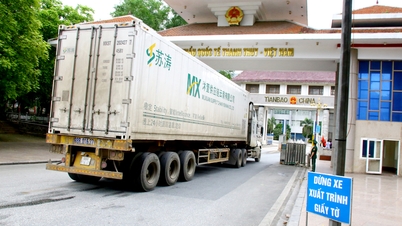




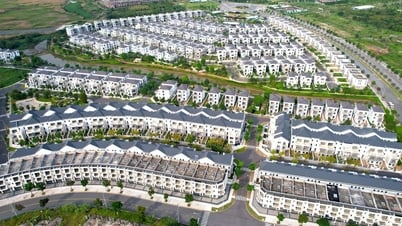



















![[Photo] Prime Minister Pham Minh Chinh inspects the progress of the National Exhibition and Fair Center project](https://vphoto.vietnam.vn/thumb/1200x675/vietnam/resource/IMAGE/2025/5/19/35189ac8807140d897ad2b7d2583fbae)















































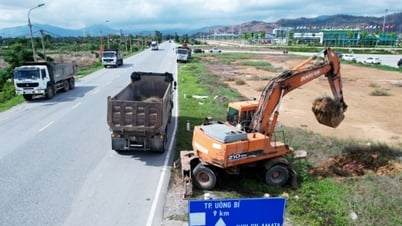









![[VIDEO] - Enhancing the value of Quang Nam OCOP products through trade connections](https://vphoto.vietnam.vn/thumb/402x226/vietnam/resource/IMAGE/2025/5/17/5be5b5fff1f14914986fad159097a677)



Comment (0)